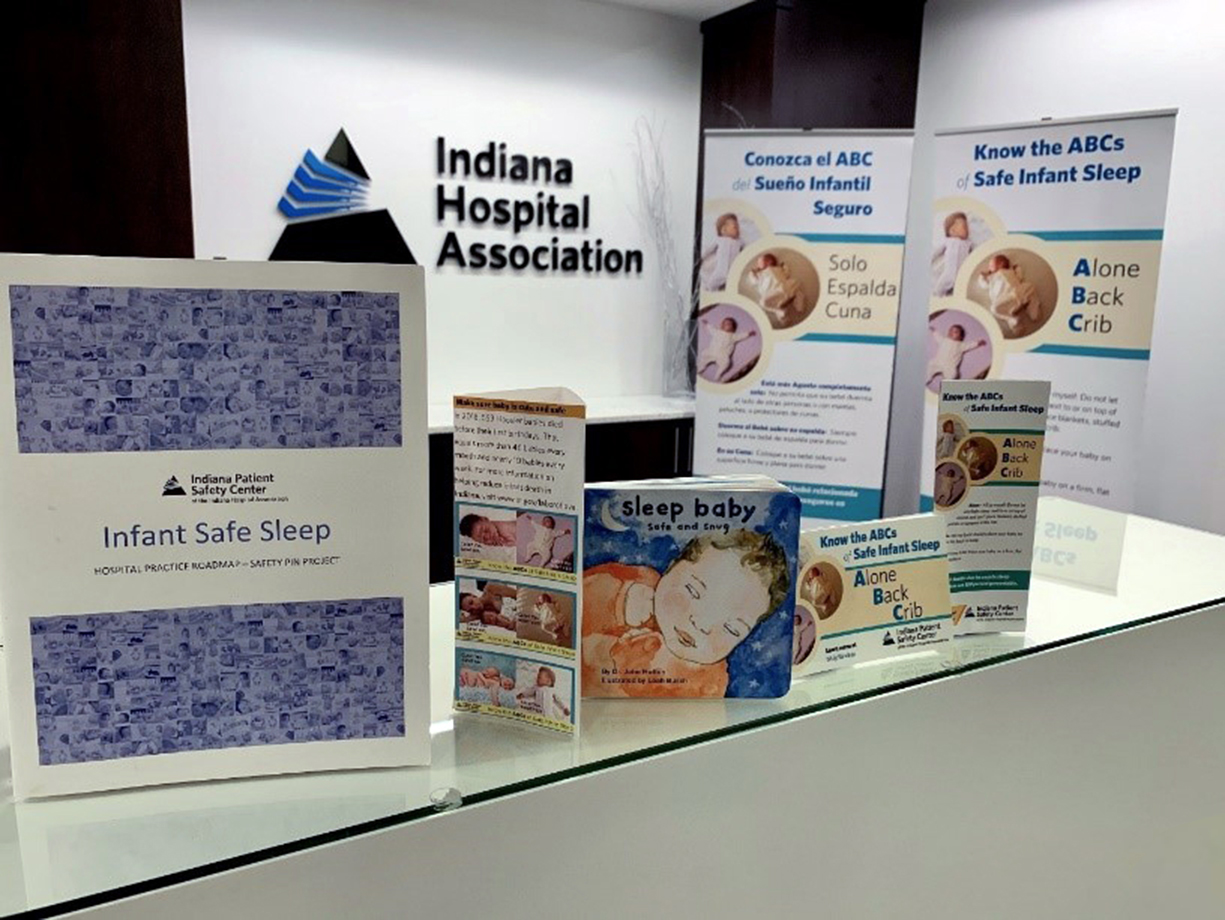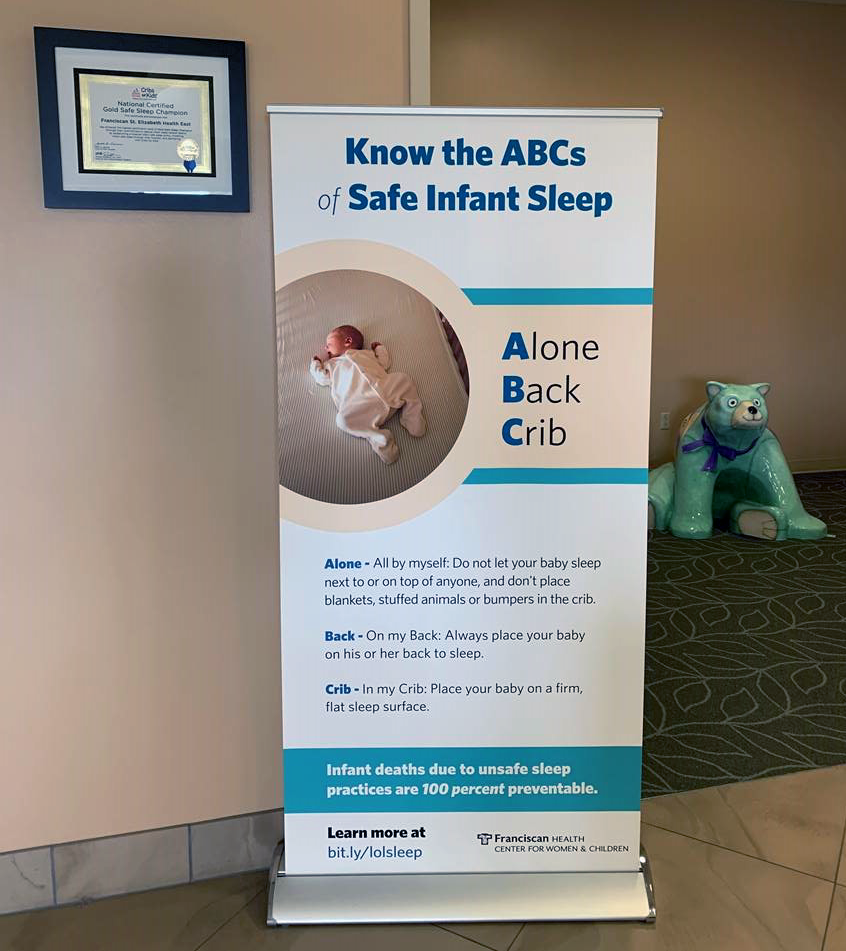Healthy babies begin with healthy moms. Indiana hospitals are committed to improving maternal and infant health, which is one of Indiana’s most pressing health challenges. Indiana ranks 43rd in the nation in infant death. Indiana hospitals fully support Governor Eric Holcomb’s goal to have the lowest rate of infant death in the Midwest by 2024. This will take much collaboration and requires a keen focus on the health of mothers.
In 2014, sudden unexplained infant deaths (SUIDs) accounted for 14.4 percent of these deaths in our state. The majority of which were due to sudden infant death syndrome or accidental suffocation/strangulation in bed. In December 2016, the Indiana State Department of Health awarded Indiana Hospital Association a four-year grant through the Safety PIN (Protecting Indiana’s Newborns) program. Through this opportunity, IHA developed a statewide strategy to implement hospital safe sleep practices and share resources. The Safety PIN program is just one of many initiatives to help reduce infant deaths in Indiana.

Because too many Hoosier babies die before their first birthday, Governor Eric Holcomb has set an ambitious goal for Indiana to have the lowest rate of infant death in the Midwest by 2024. This will take much collaboration and requires a keen focus on the health of mothers.
The Indiana Hospital Association (IHA) is committed to partnering with member hospitals to support the health and well-being of every mother and baby. In collaboration with state initiatives and programs, we are focusing this year on the adoption of environments and processes that allow for successful implementation of evidence-based best practices in key drivers of maternal and infant health. Some examples of work driving collective impact include infant safe sleep, breastfeeding, tobacco cessation, perinatal substance use, and obstetric hemorrhage.
One state initiative IHA is strongly engaged with is the Indiana Perinatal Quality Improvement Collaborative (IPQIC). IPQIC is a public-private partnership facilitated by the Indiana State Department of Health (ISDH) consisting of more than 400 volunteer experts and stakeholders, including providers, advocates, and other leaders who are committed to achieving the best outcomes. Co-chaired by State Commissioner of Health Dr. Kristina Box and Indiana Hospital Association President Brian Tabor, the mission is to ensure all babies born in Indiana have the best start in life and mothers have the services and guidance needed in every step of pregnancy. We recognize the impact of this collaborative work as shown by Indiana having a decrease in the state infant death rate from 602 infant deaths in 2017 to 559 infant deaths in 2018.
In addition to a recent decline in overall infant death, deaths attributed to SUIDs also decreased from 16.6% in 2017 to 13.9% in 2018. This outcome result is confirmation that infant deaths due to unsafe sleep are 100% preventable with the right processes in place, and we must press on with our efforts. IHA has set a goal that by Dec. 31, 2020 every Indiana birthing hospital will adopt the IPQIC hospital practice safe sleep recommendations. Birthing hospitals are actively working on policies, staff training, patient education, and quality audits to achieve this goal.

We also know that healthy babies begin with healthy moms. Maternal death is another health metric where Indiana ranks unacceptably low. Both perinatal substance use and obstetric hemorrhage are examples of risks for poor outcomes for both a mother and her baby. A state law now requires doctors and other caregivers to conduct a verbal substance abuse screening for all mothers. This screening is designed to help providers connect women with the resources needed for a healthy pregnancy and birth outcome. The earlier a woman who has substance use disorder receives treatment, the more successful treatment and other interventions will be. Targeting resources to these mothers not only improves health, but, just as importantly, can help keep families intact. Indiana also recently joined the Alliance for Innovation on Maternal Health (AIM) program, a national data-driven safety and quality improvement initiative. Through AIM, obstetric hemorrhage resources and best practices are being rolled out to healthcare providers throughout the state.
We would be remiss to not call attention to the fact that women of color, whether healthy or medically vulnerable, face even greater risk for poor outcomes. Compared to non-Hispanic white women in Indiana, the maternal death rate among non-Hispanic black women is nearly double. Non-Hispanic black babies face a death rate that is nearly triple that of non-Hispanic white babies.
We have much work to do, and we are confident that the right steps are being taken to move us forward. Conversations and action are occurring on multiple fronts – at the federal level, in the General Assembly, through the Indiana Minority Health Coalition, at town hall meetings, and among medical professionals and community grassroots organizations. We believe that Indiana health care providers are committed to walking alongside communities for collective impact to improve our state’s ranking. Implementing measures directed by IPQIC and others, we will save lives and create even more happy celebrations for Hoosier families.

